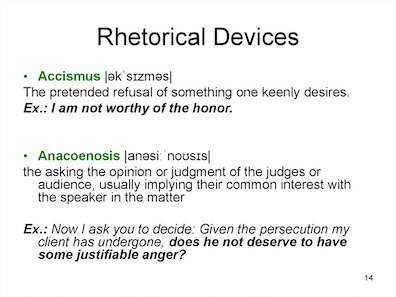Figure of speech. As Myles Crawford regales his
audience with Ignatius Gallaher's journalistic exploit, he
peppers them with questions that do not call for answers: "You
know how he made his mark? I'll tell you"; "Remember that
time?"; "Whole route, see?"; "Look at here. What did Ignatius
Gallaher do? I'll tell you"; "Have you Weekly Freeman
of 17 March? Right. Have you got that?"; "Have you got that?
Right"; "Where do you find a pressman like that now, eh?"
Rhetoricians call this anacoenosis: enlisting
listeners in your cause by soliciting their opinions in ways
that imply they will agree with you.
Anacoenosis (AN-uh-sih-NO-sis or AN-uh-ko-uh-NO-sis, from the
Greek anakoinoun = to communicate) involves so-called
rhetorical questions: queries that require a single correct
answer or no answer at all. Like synchoresis, this device
engages an audience while maintaining tight control of where
the argument is going. Many teachers employ the tactic,
punctuating their lectures with one-right-answer questions.
Anyone who offers an answer other than the desired one can be
made to feel slow, misguided, unusual, or disruptive.
Gideon Burton (rhetoric.byu.edu) cites an example from
Isaiah: "And now, O inhabitants of Jerusalem, and men of
Judah, judge, I pray you, betwixt me and my vineyard. What
could I have done more to my vineyard, that I have not done in
it?" (5:3-4). The only correct answer is "Nothing." In his
funeral oration in Julius Caesar, Mark Antony
repeatedly asks, "Did this in Caesar seem ambitious?.... You
all did see that on the Lupercal / I thrice presented him a
kingly crown, / Which he did thrice refuse. Was this
ambition?" (3.2.90, 95-97). Again, the only possible answer is
No.
Stuart
Gilbert, who calls this "the put-yourself-in-his-place
method," sees it operating in Crawford's questions. Crawford
wants buy-in, but he is opinionated, impatient, and drunk, so
he brooks no contrary opinions. Robert Seidman agrees with
Gilbert. So do I, up to a point, but some of the editor's
questions are perhaps better described by the terms hypophora
and erotesis.

